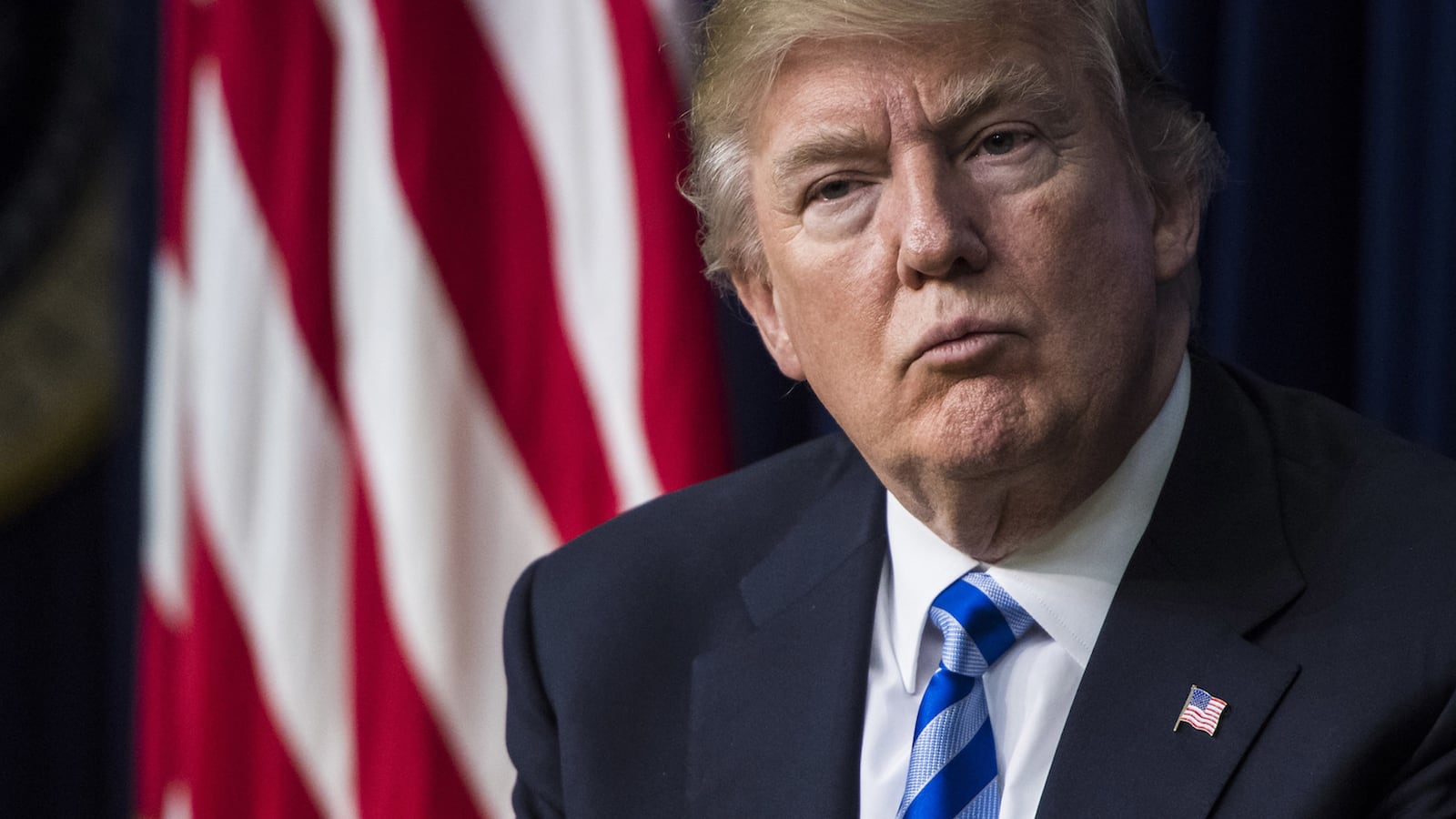LONDON — A picture of the American coalition-building style under President Donald Trump began to emerge from around the world Friday.
And the short version was: We don’t need no stinkin’ coalition.
The Brits, the Israelis, and other core allies were informed by telephone shortly before 59 Tomahawk missiles were fired at the Shayrat airfield near Homs in the heart of Syria.
The leaders of these allied nations were able to say publicly that they had been told about the attacks in advance, but so were the Russians—and even the Syrians, according to witnesses who saw the airfield being evacuated before the missiles struck.
There was to be no “Coalition of the Willing.”
Trump did not wait for the Russians to veto a UN Security Council resolution; there was no request for an emergency NATO summit. Hell, Washington (or should that be Mar-a-Lago?) didn’t even bother to ask if Britain would provide a fig leaf of international consensus as it had done during Operation Desert Fox against Iraqi targets in 1998, or the first salvoes of the war in Afghanistan in 2001.
Britain’s defense secretary admitted that his U.S. counterpart, Gen. James Mattis, was not asking for permission or even co-operation when he called.
“The U.S. made it clear this was to be a United States operation,” a chastened Sir Michael Fallon told the BBC.
The contrast to President Barack Obama’s strategy of collective action—often derided as “leading from behind”—could hardly be more stark.
Obama had backed away from his own “red line” on Syrian use of chemical weapons in the summer of 2013, shortly after British support for U.S. military strikes against the Assad regime collapsed.
As opposed to America’s willingness to strike at terror targets all over the world, unilateral missile strikes against sovereign nations have been extremely rare since President Reagan’s bombing raid against Libya in 1986, and missile strikes on Iraq in the early 1990s.
President Clinton’s humanitarian airstrikes on Serbia in 1999 took place under a NATO umbrella. President George W. Bush secured NATO support soon after a joint U.S.-U.K. intervention in Afghanistan. The alliance against Saddam Hussein took far longer to build, but Bush and Colin Powell spent months cajoling more than 40 nations to offer their support before a missile was fired. President Barack Obama led from as far behind as he could in the Libyan intervention of 2011, which was spearheaded by the French and British—which may be one reason he was so shocked in 2013 when the British parliament pulled the plug on a Syrian intervention.
The Trump administration wasted no time at all.
The order was given from Trump’s luxury resort in Florida, and staff rushed to the phones to let allies know what was about to happen.
Mattis had called the British defense secretary earlier in the day to share the U.S. assessment of the Assad regime’s culpability in the chemical attack. During that call, he discussed the military options being considered for the first time.
Awkwardly for Britain, Downing Street had been playing down any prospect of airstrikes in response to the suspected use of the deadly nerve agent sarin.
“No one is talking about military action,” a spokesman said Tuesday.
When Fallon’s phone rang late Thursday night, Mattis informed him of Trump’s decision.
Fallon explained Friday that the U.S. had never asked its allies to take part in a joint strike. “There’s a coalition involved in fighting Daesh [the so-called Islamic State] in Iraq and Syria, but the U.S. made it clear this was to be a United States operation,” he said.
In the aftermath of the attack, Britain fell right in behind the U.S.—offering its enthusiastic backing. “The U.K. government fully supports the U.S. action, which we believe was an appropriate response to the barbaric chemical-weapons attack launched by the Syrian regime, and is intended to deter further attacks,” said a spokesman for Prime Minister Theresa May.
Israel was even quicker in offering support for the strikes—less than 90 minutes after Trump spoke—Benjamin Netanyahu released a statement at 6 a.m. Israeli time.
“Israel fully supports President Trump’s decision and hopes that this message of resolve in the face of the Assad regime’s horrific actions will resonate not only in Damascus, but in Tehran, Pyongyang, and elsewhere,” he said.
Netanyahu and the Israeli security apparatus had been left infuriated when Obama backed out of military strikes that Israelis believed he had committed to deliver. Like Britain, Israel was called in advance of the strikes but it’s unclear how much time they were given to prepare—in 2013, they held talks with the Obama administration about bolstering their defensive systems ahead of the planned strikes.
A joint statement from European leaders Angela Merkel and Francois Hollande was less enthusiastic about the unilateral strike but blamed Assad for the escalation.
“President Assad alone bears responsibility for this development. His repeated use of chemical weapons and his crimes against his own population had to be sanctioned,” the German and French leaders said.
German Foreign Minister Sigmar Gabriel sounded even more cautious.
“As understandable as a U.S. military strike against military structures is after the failure of the Security Council, it’s just as crucial to look at joint peace efforts in the framework of the UN,” he said.
Australia—a U.S. ally so loyal that it joined the military intervention in Vietnam when even the British steered clear—offered its support for the strikes in Syria, but was keen to emphasize that the U.S. had reassured it that this was not a growing conflict and was not aimed at regime change.
“This was a calibrated, proportionate, and targeted response,” said Malcolm Turnbull, Australia’s prime minister. “But we are not at war with the Assad regime, and the United States have made it clear that they are not seeking to overthrow the Assad regime.”
Turnbull, along with Netanyahu, May and Merkel, will be among the first to hear if Donald Trump decides that has changed.






